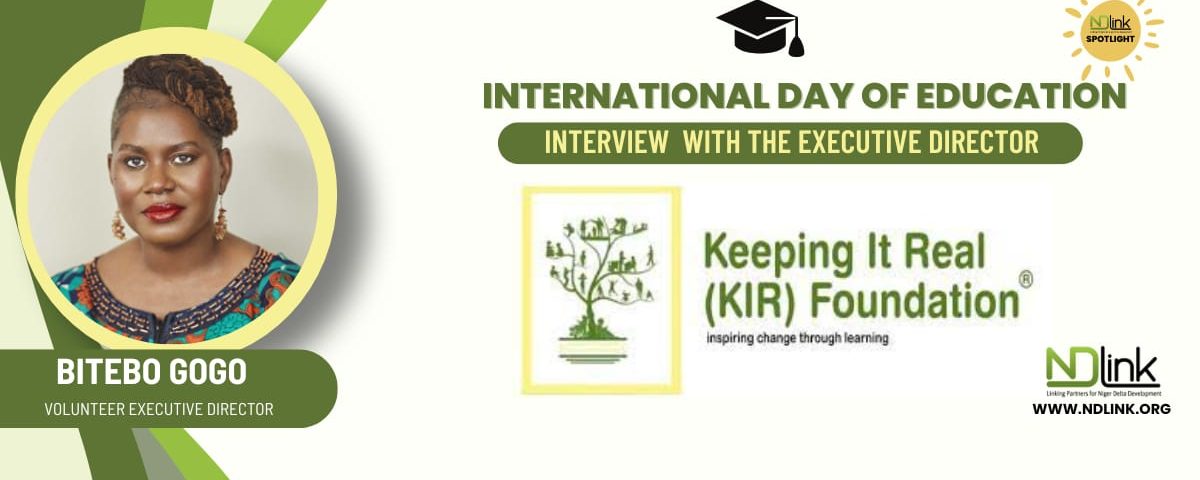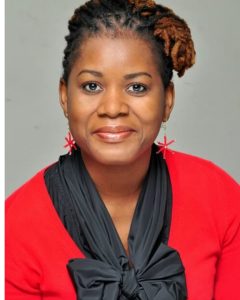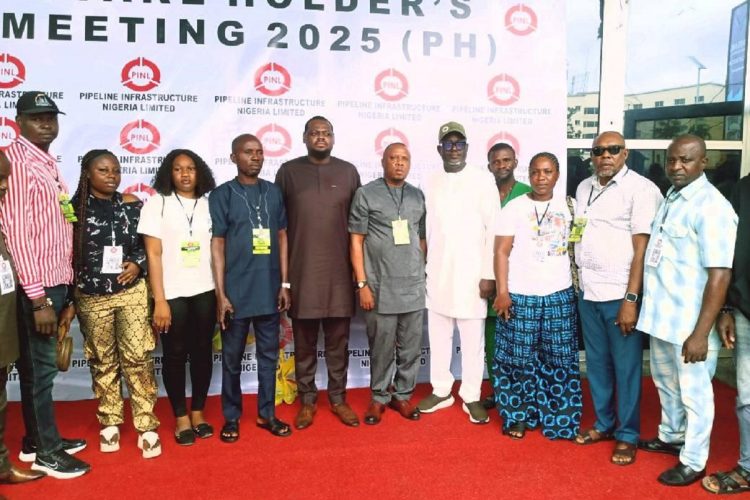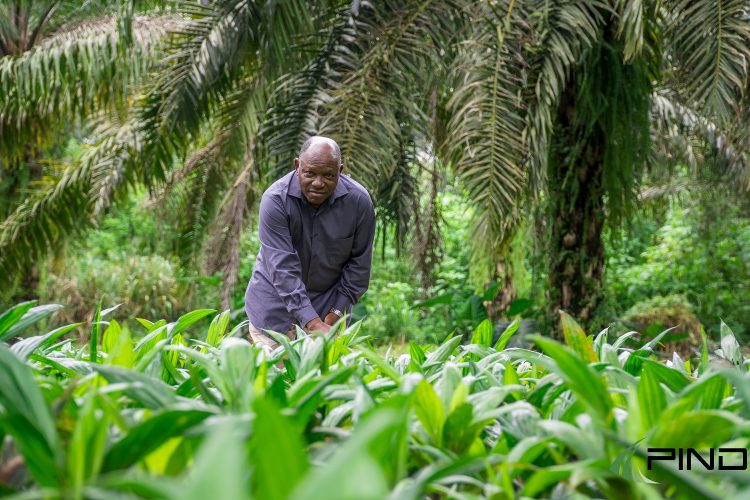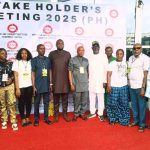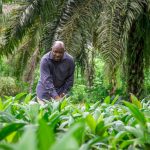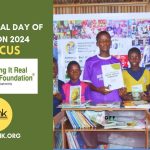
International Day of Education 2024: Organisation in Focus Keeping it Real (KIR) Foundation)
January 24, 2024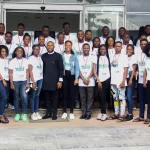
Request for Applications – Internship to support PIND’s Integrated Peace and Development Unit (IPDU)
January 25, 2024AN INTERVIEW WITH BITEBO GOGO Volunteer Executive Director and Chief Servant of Keeping It Real (KIR) Foundation
To mark International Day of Education 2024, NDLink had a chat with the Volunteer Executive Director of Keeping it Real (KIR) Foundation, Mrs Bitebo Gogo. KIR has been instrumental in improving accessibility to education among youth, marginalised and underserved populations and due to the organisation’s impact we carried out this interview for a more in-depth understanding of the organisation and how its work fits with the theme of International Day of Education 2024.
In celebrating World Education Day, can you reflect on the journey of your organization in providing education for underserved communities and persons with disabilities in Nigeria over the past decade? And what has been your impact?
Education is a human right, a public good, and a public responsibility. According to Nelson Mandela, “Education is the great engine of personal development. It is through education that the daughter of a peasant can become a doctor, that the son of a mine worker can become the head of the mine, and that the child of a farm worker can become the president of a great nation. It is what we make out of what we have, not what we are given, that separates one person from another. Our central purpose in the Keeping It Real (KIR) Foundation is to inspire change through learning because we believe that change can only take place when people are taught to behave differently, and it is learning that provides opportunities for people to grow, change, and become positive change makers.
The KIR Foundation has been in operation since 2011 as a disability-inclusive organization. We have identified lifelong learning as a necessity for addressing educational and socioeconomic issues and closing educational gaps by donating books, teaching market-relevant skills, and advocating for the rights of our underserved and marginalized beneficiaries (vulnerable children, youth, persons with disabilities, prison inmates, women, and our local communities).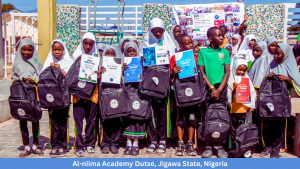
We develop their capacities through sustainable projects focused on education, advocacy, capacity, and sustainable development as a means of breaking the cycle of illiteracy, poverty, and inequality and replacing them with a new cycle of empowerment, opportunity, and ethical and transformative leadership.
In the past 13 years, we have set up 84 reading corners in the 36 states of Nigeria and Abuja, donated over 46,294 books and read to more than 43,087 children, and supported 6 prisons in Port-Harcourt, Lagos, and Abuja with learning resources. We have trained over 1,566 youth with and without disabilities in market-relevant skills and supported 133 students with disabilities with assistive devices like Braille slates, typewriters, computers, and writing materials so that they can learn effectively. We have published ‘The Young Leader’s Guide’, a leadership manual for young people, and ‘It’s About Empathy, an Explanatory Guide to the Discrimination Against Persons with Disabilities (Prohibition) Act 2018. All our projects are strategically aligned with promoting and implementing the Sustainable Development Goals (SDGs) 1, 4, 5, 8, 10, and 17.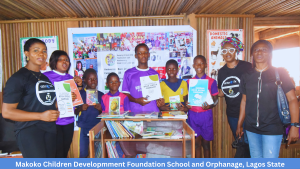
What have been your main challenges and notable victories in achieving this?
Some of our challenges include the following:
The lack of cooperation from the school management is because they believe that non-profit organizations have received funds from donors and should provide personal support. Meanwhile, we operate on a very limited budget, so we set up reading corners, donate books, and host career guidance and counseling workshops and leadership sessions because we genuinely want to improve the quality of education and give our beneficiaries a bright future. The ways we have overcome this challenge are by being consistent in our values, supporting the teachers as our stakeholders, and providing teaching materials for them. Since 2021, we have been training the teachers we work with on leadership, the importance of technology in education, and lifelong learning. Also, we have cultivated mutually beneficial relationships with them, and we give our outstanding teachers awards.
The mindset among students with disabilities and their caregivers or teachers is that we want to exploit them. We resolved this by becoming members of the Joint National Association of Persons with Disabilities, mentoring young people with disabilities so that they can become self-advocates (Maria Okese, the first Miss Deaf Nigeria), running disability inclusive projects to ensure that persons with disabilities are integrated in development and socio-economic issues, holding focus group discussions to conduct needs and opportunity assessments, insisting on stakeholder engagement to ensure project sustainability, advocating consistently and passionately for disability inclusion, and not overstaying our welcome. Thus, over the past decade, disability communities have finally accepted the KIR Foundation as a reliable partner and genuine advocate for disability rights.
Lack of support from the government and adverse policies make it difficult for nonprofits that are doing honest work to implement projects efficiently and effectively. We have to register with and report to multiple government agencies before we can perform our responsibility as good corporate citizens. Although it is an ongoing process, we are members of various non-profit groups, like the Nigerian Network of NGOs, and we try to comply with government regulations and policies.
Lack of funding has limited the projects we want to implement. We have learned to leverage partnerships, technology, and strategic planning to scale and maximize our impact.
What policy changes or improvements at the government level would you suggest to further support education for underserved communities and persons with disabilities in Nigeria?
A review of the 2024 budget indicates that the education sector got N1.54 trillion, representing 6.39 percent of the total budget. This is far below the 15 percent recommendation by UNESCO.
Education is the foundation for the development of any country. Nigeria has a demography of over 70% youth; it has the highest number of out-of-school children in Africa and the 3rd in the world with 20.2 million children and youth out of school. This paints a dismal picture for the country, and with the theme of this year’s International Day of Education, ‘Learning for lasting peace’, it will be difficult for the country to achieve peace when education is underfunded because youth restiveness is inevitable.
The 5-year moratorium on the Nigerian Disability Act expired on Friday, January 19, 2023. Although the National Commission for Persons with Disabilities (NCPWD) was established by the Federal Government of Nigeria under Section 31 of the Discrimination against Persons with Disabilities (PWDS) (Prohibition) Act, 2018 to promote, protect, and prioritize the rights of PWDs and to enhance their productivity through education, health, and other socio-economic activities, it has been grossly underfunded. Therefore, it has been unable to implement government services and actions into systems that equally and meaningfully drive the representation and participation of Nigerians with disabilities, especially in all procedures and processes around designs, implementation, budgeting, enforcement, and monitoring. The government must empower the NCPWD with the funding it needs to ensure that disability inclusion is entrenched in our schools and no child or youth with disabilities is left behind.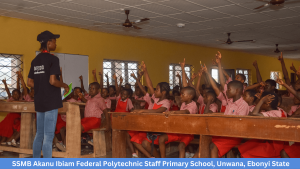
Teacher training must be prioritized because the teachers we have will determine the quality of education and the students we will have.
What final words do you have for those hoping to make an impact on various causes to improve the state of the world?
- Learn to lead and develop yourself first, because who we are affects others, and we cannot give what we do not have. In summary, be the change you want to see.
- Self-motivation and passion will burn out; you must have a compelling WHY or purpose that continually drives you to want to make a difference. My death-bed experience compels me to keep going despite all the challenges, even though I have been a volunteer executive director for 13 years (no salary or allowance).
- Become a lifelong learner and commit to learning all you can about the fundamentals of the non-profit sector and your areas of interest so you can make informed decisions.
- Collaborate with relevant stakeholders for maximum impact.
- Be values-oriented, mission-focused, and enjoy the journey.
- Define what success means to you, and do not be distracted by others.
- Be people-focused and have project-ready skills.
- Tell your impact story to inspire people, not to exploit them or gain cheap popularity on social media.
To learn more about KIR Foundation and its impact, check out our International Day of Education organisational focus using this link: https://ndlink.org/international-day-of-education-2024-organisation-in-focus-keeping-it-real-kir-foundation/


